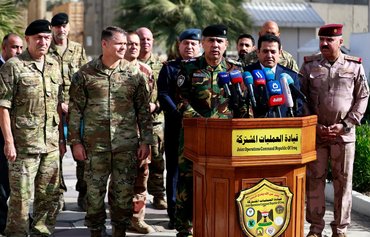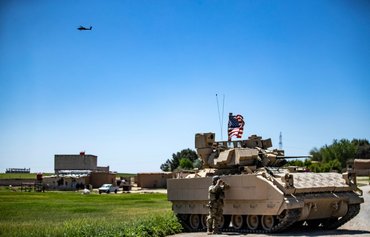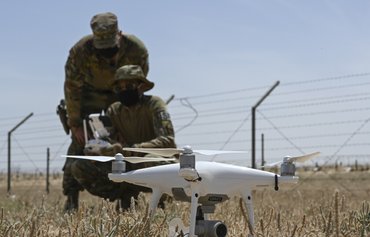There has been a "reduction in attacks" carried out in Iraq and Syria this year by the "Islamic State of Iraq and Syria" (ISIS), senior members of the 84-member international coalition said Monday (April 24).
But they warned in detailed online briefings Monday and on February 28 that the extremist group poses a lingering threat.
They also noted that Iran and Iran-backed threats to the region, as well as growing malign co-operation between Iran and Russia, are "only increasing".
ISIS overran swathes of Iraq and Syria in 2014, establishing a proto-state in a campaign marked by mass killings, torture, rape and slavery.
![US troops patrol in the countryside of Syria's al-Hasakeh province on February 18. [Delil Souleiman/AFP]](/cnmi_am/images/2023/04/25/41819-US-troops-Syria-600_384.jpg)
US troops patrol in the countryside of Syria's al-Hasakeh province on February 18. [Delil Souleiman/AFP]
![Iraqi security forces display weapons seized in Anbar during a successful operation against ISIS on April 21. [CENTCOM]](/cnmi_am/images/2023/04/25/41817-us-iraq-isis-600_384.jpg)
Iraqi security forces display weapons seized in Anbar during a successful operation against ISIS on April 21. [CENTCOM]
The international coalition and its partners ousted the group from territory it held in Iraq in 2017 and in Syria in 2019, but ISIS cells continue to carry out sporadic attacks in both countries.
In Iraq this year through early April, "we have seen a record of a 68% reduction in attacks when compared to the same period last year", said international coalition commander US Maj. Gen. Matthew McFarlane.
In Syria, "we recorded a 55% decrease during the same time", he said.
The attacks attributed to ISIS fighters this year have been "relatively small, from one to a few individuals", he said, adding that the group "has failed to organise or co-ordinate anything more than that over the past year".
Ramadan, which ended last week, was "one of the most peaceful in years", he said, noting an "80% decrease from last year" in Iraq and 37% for Syria.
International coalition forces conduct wide-area security operations in support of security partners and precision operations to remove ISIS leaders in Syria and Iraq, he said during a February briefing.
"Year over year, we have seen a decrease in the number of ISIS attacks and the effectiveness of those attacks," McFarlane said.
In Syria, the coalition remains focused on preventing the re-emergence of terrorist ideology as it works with the Syrian Democratic Forces (SDF), he said.
"ISIS is continually trying to rebuild leadership based on the coalition effectively disrupting senior leaders," McFarlane said.
He stressed the need "to not only keep pressure on the entire network but also monitor and track ISIS as they try and re-emerge".
Enduring commitment to region
In a February report, the United Nations (UN) estimated ISIS still has "5,000 to 7,000 members and supporters" across Iraq and Syria, "roughly half of whom are fighters", AFP reported.
In Iraq, ISIS cells operate in rural mountain areas, "leveraging the porous Iraqi-Syrian border and retaining manoeuvrability to evade attacks" while trying to "rebuild and recover", the UN report said.
The report estimated ISIS's "dwindling cash reserves" at $25 million to $50 million and said it had started investing in hotels and real estate to launder money and engaging in cattle rustling to raise funds.
"Even though ISIS no longer holds territory, it still has the ideology to inspire and recruit members to its ranks, and it has the will to reconstitute," US Deputy Assistant Secretary of Defence Dana Stroul said in February.
This is why "we are committed to strategic patience and supporting our partners to ensure that this terrorist army cannot reconstitute and terrorise the people and citizens of Iraq and Syria or, indeed, the rest of the Middle East", she said.
The US commitment to the Middle East is enduring, Stroul stressed, noting that it is maintaining its force presence, is committed to its partners, and is expanding ways to work with them and to enable and empower them.
Threat from Iran, Russia
In Syria, Stroul said Monday, "we continue to see unsafe and unprofessional area activity from the Russians".
She had previously also pointed to a "constellation of increasing Iranian threats", noting that "we see Iran and Iran-backed threats to the region only increasing".
"We see them on ground by Iran's sponsorship, arming, training, funding and direction of militia groups, proxies, and non-state actors on the ground," she said.
"We see it in the air threats from Iran's proliferation of missiles and one-way attack drones to non-state actors across the region."
"And finally, we see the increasing aggression at sea by its maritime actions."
"That's not even to begin on its malicious cyber activities, which have clearly threatened not only partners in the Middle East but outside the Middle East."
"We are now at a point where Iranian threats are no longer specific to the Middle East, but a global challenge," Stroul said.
"And that is a result of the increasing military co-operation between Iran and Russia, and the illicit transfer by Iran to Russia of one-way attack drones that are being used in Ukraine to kill Ukrainian civilians."
In addition to countering these activities, Stroul said, "we now need to rally a coalition not only in the Middle East, but a global coalition to push back on the malign co-operation between Iran and Russia".
"It is reasonable to expect that the tactics, techniques, and procedures that the Iranians are learning and perfecting in Ukraine will one day come back to threaten our partners in the Middle East," she said.

![US forces patrol in the vicinity of the Hori rehabilitation centre for children of suspected ISIS elements in Syria's northeastern al-Hasakeh province, on December 15. [Delil Souleiman/AFP]](/cnmi_am/images/2023/04/25/41820-US-soldier-Syria-600_384.jpg)






